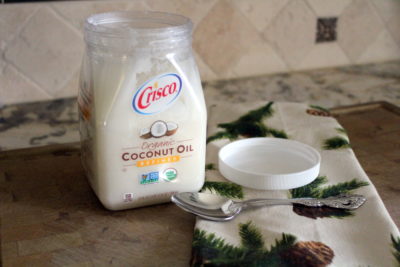
Everyone I know is trying to eat healthier. Not just as a New Year’s resolution, but as a long-term health goal. My husband and I are right in there, doing all we can to eat right and exercise.
Earlier in the week, I made a tomato tart for dinner. It is simply fresh tomatoes that have been sautéed, then put them in the bottom of an oven-safe dish, cover with a homemade pie crust and bake. Serve it with a salad and you have a decently healthy meal.
I usually make pie crusts with Crisco Vegetable Shortening, but I was out. The tomatoes were ready for the oven, just waiting for a crust. The only thing close in consistency I had on hand was coconut oil. I used an amount equal to what I use with vegetable shortening as a recipe substitution.
Reading the labels, the vegetable shortening looks healthier because it is fewer calories and less total fat and saturated fat. However, there are believed to be several health benefits of coconut oil such as raising HDL (the good cholesterol), promoting weight loss, and helping with Alzheimer’s patients’ brain function. However, an article titled “The Truth About Coconut Oil” on WebMD explains why many of the health benefits are not proven.
Mayo Clinic’s article titled “Coconut Oil for Weight Loss,” similarly mentions the competing findings of research regarding the benefits, if any, of coconut oil on weight as well as LDL and HDL.
As always, when reading about the health claims made in favor of coconut oil or any product, look at the source (i.e., is it a trusted medical source?) as well as how the research was conducted (i.e., does it cite actual, long-term research findings?). At this point, there is no irrefutable evidence that coconut oil is healthier than vegetable oil nor that it has any proven health benefits. What can be agreed upon is that more research is needed.
Should you make the switch to coconut oil? Only you can decide. For me, I think I will go ahead and restock the Crisco Vegetable Oil and take turns using it and the coconut oil.
